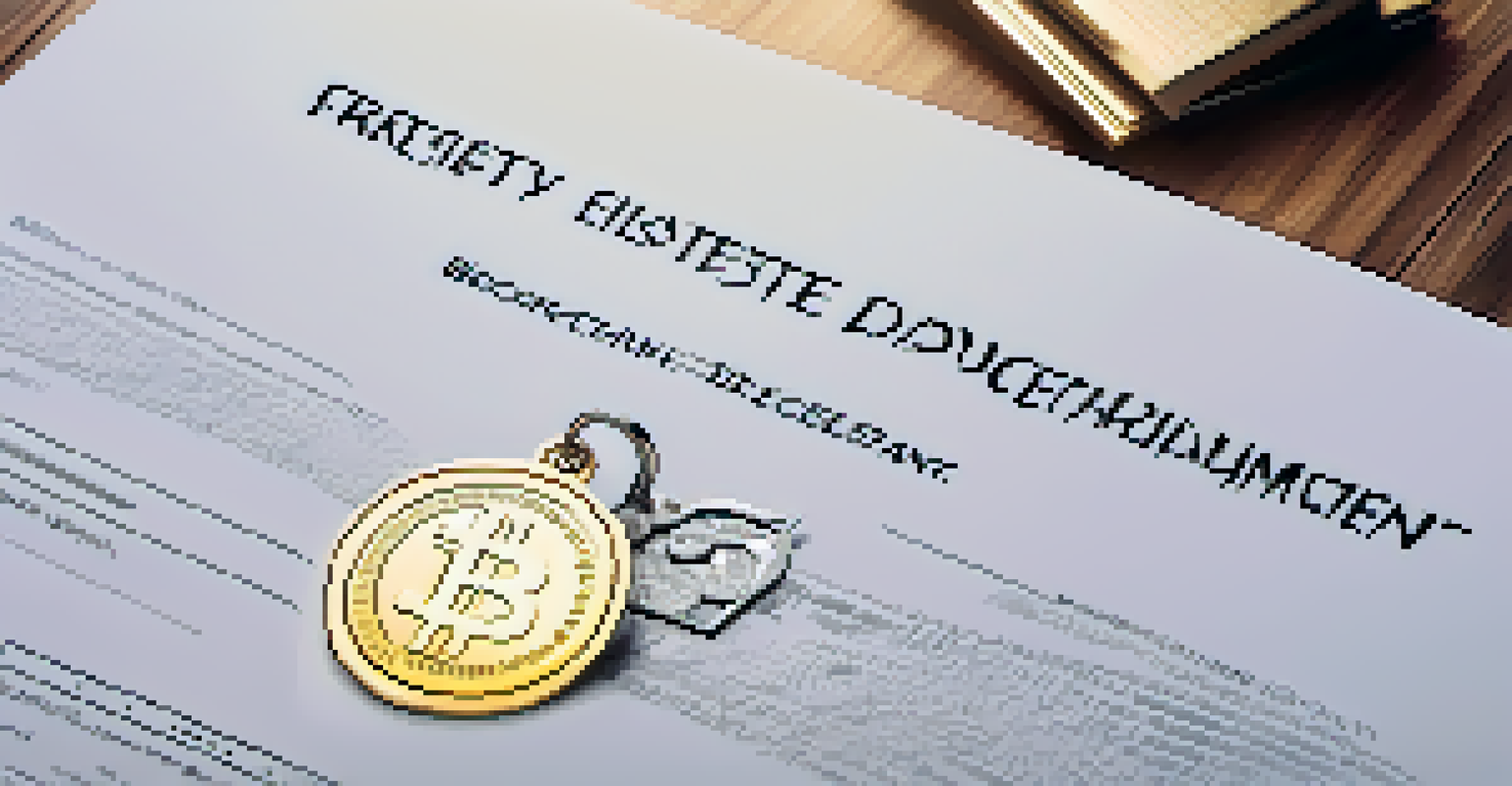Blockchain and Property Title Management: A Revolution

Understanding Blockchain Technology and Its Basics
Blockchain is a decentralized digital ledger that securely records transactions across multiple computers. This technology ensures that once data is entered, it cannot be altered or deleted, providing a transparent and tamper-proof system. Imagine a library where every book is an individual transaction, and each time someone reads or checks out a book, it's logged without the possibility of changing the content.
Blockchain is the tech. Bitcoin is merely the first mainstream manifestation of its potential.
At its core, blockchain operates on a network of nodes, where each node holds a copy of the entire blockchain. This redundancy means that even if one node fails, the information remains intact across others. It's like having multiple copies of a family photo stored in different places; as long as one exists, the memory is preserved.
This technology has far-reaching applications, and one of the most promising areas is property title management, where accuracy and security are paramount. By leveraging blockchain, we can ensure that ownership records are reliable and easily accessible, paving the way for a more efficient real estate process.
Challenges of Traditional Property Title Management
Traditional property title management often relies on paper-based records, which can be prone to errors, fraud, and loss. For instance, if a title is lost or damaged, recovering that information can be a lengthy and frustrating process. This inefficiency not only slows down transactions but can also lead to disputes over property ownership.

Moreover, the current system involves multiple intermediaries, such as title companies and government offices, which adds layers of complexity and cost. Each party needs to verify the title, leading to delays and increased transaction fees. Think of it like a game of telephone; by the time the information reaches the final party, it may have changed or been misunderstood.
Blockchain Enhances Title Security
Blockchain technology provides a decentralized and tamper-proof system for securely managing property titles.
As cities expand and populations grow, the need for a more efficient title management system becomes increasingly critical. The traditional methods simply cannot keep pace with the demand for quick and reliable property transactions, highlighting the urgent need for innovation in this space.
How Blockchain Can Transform Title Management
Blockchain technology can revolutionize property title management by providing a secure, transparent, and immutable record of ownership. Each property can have its own unique digital identity on the blockchain, making it easy to track changes in ownership over time. This process is akin to having a digital passport for your property, detailing its history and current status at a glance.
The blockchain is an incorruptible digital ledger of economic transactions that can be programmed to record not just financial transactions but virtually everything of value.
With smart contracts—self-executing contracts with the terms directly written into code—transactions can be automated, reducing the need for intermediaries. For example, when the agreed-upon conditions are met, ownership can automatically transfer from the seller to the buyer without the need for extensive paperwork. This innovation not only speeds up the transaction but also minimizes the risk of fraud.
Additionally, blockchain's decentralized nature means that all parties involved can access the same information in real-time, fostering trust and collaboration. Imagine a world where buyers, sellers, and lenders can all see the same verified title information instantly, eliminating misunderstandings and discrepancies.
Benefits of Using Blockchain for Title Management
The primary benefit of utilizing blockchain for property title management is enhanced security. Since the records are stored across a decentralized network, they are less vulnerable to hacking or data loss. This increased security reassures property owners and buyers alike, knowing that their investments are protected.
Another significant advantage is the reduction in transaction time and costs. By streamlining the title transfer process and eliminating intermediaries, buyers and sellers can save both time and money. Picture a scenario where a property sale that traditionally takes weeks can now be completed in days, allowing for quicker access to funds and new ownership.
Streamlined Transactions with Blockchain
By automating processes through smart contracts, blockchain significantly reduces the time and cost involved in property transactions.
Furthermore, the transparency offered by blockchain helps to build trust in the real estate market. When all transactions are visible and verifiable by all parties, it reduces the likelihood of disputes. This transparency is particularly beneficial in areas where property fraud is prevalent, as it helps to establish a clear chain of ownership.
Real-World Applications of Blockchain in Property Management
Several countries and companies are already experimenting with blockchain technology in property title management. For instance, Sweden has launched a pilot program that utilizes blockchain to streamline the property registration process. This initiative has shown promising results, reducing the time it takes to complete a property transaction significantly.
In the United States, startups are emerging with platforms that allow users to buy and sell property using blockchain. These platforms enable buyers to access verified title information and complete transactions securely and efficiently. Imagine being able to purchase a home with a few clicks, all while knowing that the title is legitimate and secure.
Internationally, blockchain is being used to facilitate property transactions in developing countries where traditional systems are often unreliable. By providing a secure and transparent framework for title management, blockchain can help create a more stable property market, fostering economic growth and community development.
Regulatory Considerations for Blockchain in Real Estate
While the benefits of blockchain in property title management are clear, there are also regulatory challenges that need to be addressed. Governments must create a legal framework that recognizes blockchain records as valid and enforceable. This process involves collaboration between regulators, real estate professionals, and blockchain developers to ensure compliance and security.
Another consideration is the need for standardization across the industry. Different regions may adopt varying blockchain solutions, which could lead to interoperability issues. Just as different banks have different protocols, if real estate platforms can't communicate, it could complicate transactions and diminish the technology's effectiveness.
Global Adoption of Blockchain Solutions
Countries are beginning to embrace blockchain for property management, paving the way for a more efficient and transparent real estate market.
As the technology evolves, continuous dialogue among stakeholders will be crucial. By working together, we can establish clear guidelines that support innovation while protecting consumers and maintaining the integrity of the property market.
The Future of Blockchain in Property Title Management
The future of blockchain in property title management is bright, with potential advancements that could further streamline the process. As more countries recognize the benefits of this technology, we may see widespread adoption, leading to a more efficient global real estate market. Imagine a future where buying and selling property is as easy as sending an email—a seamless and transparent experience for everyone involved.
Moreover, advancements in related technologies, such as artificial intelligence and the Internet of Things, could complement blockchain solutions. For instance, AI could help analyze market trends and property values, while IoT devices could provide real-time data about property conditions. Together, these technologies could create a comprehensive ecosystem for property management.

In conclusion, as we continue to explore the possibilities of blockchain, the real estate industry stands on the brink of a transformation. Embracing this technology could not only enhance the efficiency and security of property transactions but also empower individuals and communities with better access to real estate opportunities.